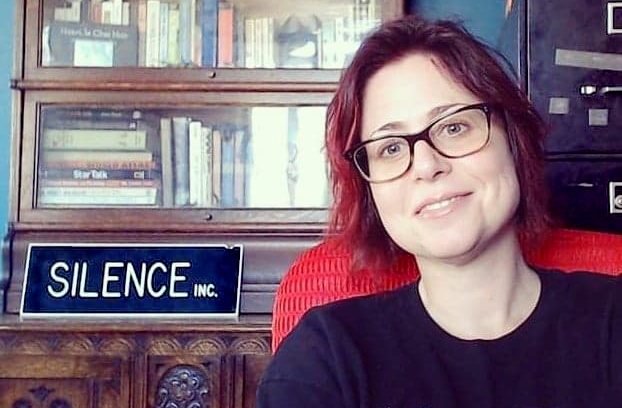Ah, the wonderful world of work. It’s a marvel, isn’t it? The way we have all indirectly given up our individual freedoms in hot pursuit of the all mighty dollar. The way we semiconsciously reorder our priorities to accommodate all the time and energy this pursuit demands. The years spent participating in the unending ritual of 9-5, Monday through Friday, that requires so much more of us than our meager weekends offer in return. Decades making unhealthy habits out of coping mechanisms, simply to survive the work week. Or at least that’s how it feels when you are autistic.

Becca Lory Hector, CAS, BCCS
For autistics, the world of work is far from wonderful or marvelous. For us, it’s more of a mental mystery that must be solved, and emulated, in order to earn your rewards. Or maybe think of it as a timed test in which failure means returning to the beginning with one less pencil and zero erasers. No matter the analogy you prefer, work for autistics is a mine field of unwritten social rules and nonsensical adult behavior in which we are required to participate, trauma aside.
I am no different than my autistic peers. My job history is, by neurotypical standards, a giant mess. In the years leading up to my autism diagnosis at 36, I went through jobs like nobody had ever seen before, or so I thought. In the span of 15 years, I interviewed, got hired, and worked in 13 different jobs, in 11 different fields. I tried everything from being an executive assistant, to working in construction, to being a veterinary technician. In each job, the cycle was the same and so was the trauma.
I would breeze through the interview process, confident my “crazy rolodex brain” would know enough to sound a little knowledgeable in the field, knowing that at some point I had read a book or watched a documentary about it, so a tidbit or two would be filed away for just this occasion. The first day would always be the hardest. No way to properly prepare when you have no idea what you are getting into. But, after a day or two, I would have memorized most people’s routines and have found the pattern for appropriate dress, bathrooming, and eating. After that it gets easy for a bit.
My brain loves information and learning a new skill is way up my alley. In each job, the first few weeks were fun. All kinds of information filling my brain, as it comes up with faster and better ways to do the tasks. But my brain will soon master it all, and that’s when trouble sets in. With nothing new to learn, and 8 hours to occupy with only 4 hours’ worth of work, I get bored. I start to notice that folks have noticed me and now they want to know more. In comes the social aspect of work, and I get sucked in, certain that this time I can master it. Sadly, that is never the case and, ultimately, it will begin to burn me out and lead to a meltdown. Then it’s just a matter of time before I get a talk about my “dramatic” behavior in the office and get fired, or I quit first – all 13 times over the span of 15 years.

Becca presents on adult autism supports with her Emotional Support Animal, Walter, at the Association of Occupational Therapy’s National Conference.
When my autism diagnosis entered the picture, I was in burnout and suicidal from my last “cycle” of work. It gave me the chance to rethink a lot of things in my life and a reason to figure out what I could do differently and better. I did this with all parts of my life but the one that was the most important, was rethinking employment. In theory, I was given some clues as to where some of my work struggles were originating, and I came to realize that employment was challenging to me for a number of reasons. Some were related to my personal brand of autism, like struggles with transitions and sensory overload, but some had nothing at all to do with it.
In fact, the stuff I struggled with most, was going to be the same no matter where I went to work. When I really looked at why work was such a challenge, it really came down to a lot of those unwritten social rules. For example, I simply cannot do a “normal” work schedule. My autistic brain hyper focuses and when it does, it takes me half the time of most to complete my tasks. It leaves me feeling trapped at work for no reason, a feeling I recognize from my school years. Additionally, in order for my time off to actually be restful AND productive, I need more time for my brain to transition out of work and into home mode, and vice versa.
Another struggle point for me lies with my colleagues and the unwritten rules. You know how we are taught to have pride in our work and standards? How our parents tell us to work hard, and we will be rewarded? Well, both of those are lies in the reality of the workplace. If you work too hard, your colleagues will not like you and will look for reasons to get you in trouble. If you work too slow, you also get in trouble from colleagues. If you don’t socialize at work or slack off on the internet with your colleagues, you are quickly shunned. If you don’t complain about your boss, your pay, or your job, you will also be shunned. As an autistic, I know no other way to do something than with 150% of myself. I am uninterested in complaints without solutions. I cannot slack off at work without feeling guilty that I am stealing. For all of these reasons, and a few others, I am not built for the current American workplace, and neither are thousands of other autistic people.
Until recently, the solution for us has been to work part-time. Limiting our hours and contact, and also our income. As one of many autistic adults that would like to earn an income that I can live off of, I was faced with a choice. I could either begrudgingly get through my life going through cycles or I could get creative and make my own rules about work. Thusly, I chose to be creative and create my own path to an income that matched the life I wanted to live.
After years of watching my bosses make mistakes, I knew there was only one boss whose decisions I could tolerate, and that was me. It was time to go out on my own and make a living my way and on my terms. I was ready to be self-employed.
Self-employment is no easy route to take. It means no days off and many hours working for little or no pay. It means hustling every single day for ways to get paid. It means creating your own marketing and network. It means knowing your value enough to ask to be paid for your knowledge. It means budgeting EVERYTHING and many times it means going without. Still, what self-employment offers, makes all of that worth it ten times over.
In a world that finds difference to be a weakness, creating your own rules is looked at with suspicion. But for many of us on the spectrum, it is the only way that we can be happy adults and also maintain employment. It means control of your schedule and your spoons. It means choice when it comes dress, meals, and other personal needs. It means being able to balance your life, your loves, and your responsibilities. It means telling yourself that all this time you were capable, it was the systems that weren’t working. It means being honest with those around you, and yourself, and admitting that world isn’t quite ready for us in all of our autism-ness.
I sit here writing this at an odd time in my work history. After 7 years of self-employment, I am taking a risk and returning to the one job of the 13 that I actually enjoyed, but it is not without taking the lessons that working for myself has given me. Self-employment taught me so much about myself, how resilient and creative I am, how I can face big decisions and make them because I trust myself and my strengths again, and how I can do the hard things and come out on top because I have learned not to fear making mistakes. Through the years, I have learned to confidently say yes to risks because I know now that I can be full of fear and courageous at the same time. In other words, I have learned my value, gotten my priorities in order, and know that under zero circumstances will I ever give up my personal freedoms in pursuit of a paycheck ever again, no matter how big.
As a kid, I struggled with authority figures for some of the same reasons I struggled with bosses in adulthood. My brain cannot help but to work at 150%. My brain cannot stand inefficiency. My brain has no tolerance for unjust and nonsensical behavior. My brain loves to create organization from chaos. My brain likes to streamline and edit. My brain does not see age, authority, position, power, color, race, or gender. My brain sees logical and illogical. In theory, this makes me an ideal employee. In practice, it makes self-employment the most logical and viable solution.
Becca Lory Hector, CAS, BCCS, is an autism and neurodiversity consultant/author/speaker/advocate based in Colorado. You can find more of her work, sign up for her newsletter, and follow her social media by heading to her website, www.beccalory.com. You can also email her directly at info@beccalory.com.





[…] article was originally published by Autism Spectrum News. Ah, the wonderful world of work. It’s a marvel, isn’t it? The way we have all indirectly given […]